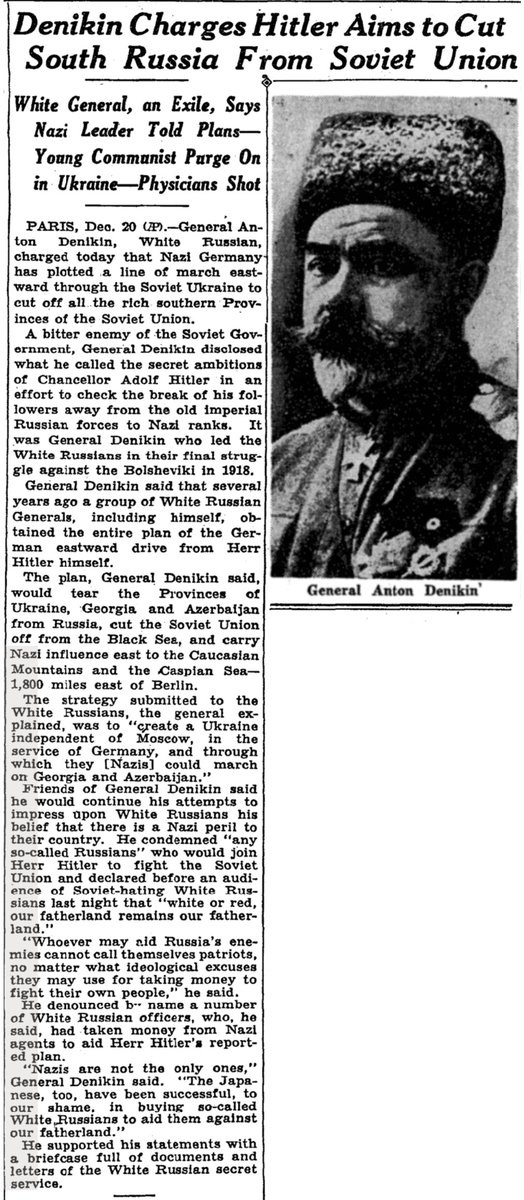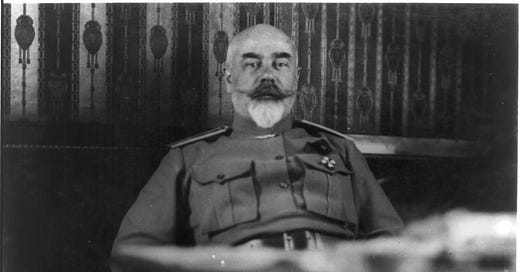White Russian “saviors”
"I don't know where to start, because I've been through so much...I survived the following pogroms: Petliura, Denikin, Sokolovsky and other gangs in general."
This is an installment of The Soviet Jew: A Weaponized Immigrant’s Tale. Read the previous bit here.
“General Denikin before surrendering command of the Volunteer Army,” 1920
I got one more thing I want to add to something I’ve been writing about recently: my surprise at finding out that during the pogroms of the Russian Civil War many Jews in Ukraine — at least initially — welcomed Anton Denikin’s White Russian forces and greeted them as liberators. What made this surprising is obvious: Denikin’s Volunteer Army wasn’t just fighting the Red Army to restore an Imperial Russia, it was also one of the main forces carrying out pogroms against Jews — pogroms that killed and brutalized hundreds of thousands of people. I wrote about this earlier — so check it out here and here if you haven’t already.
Today, I want to reprint something that expands on that theme a bit: the testimony of a pogrom survivor that touches on this forgotten aspect of Jewish-White Russian relations during the Russian Civil War.
The testimony was given in November 1919 by a 12-year old girl named Rosa Rosenwasser. She lived in Vasilkov, a small town on the outskirts of Kiev where half the population was Jewish at the time. Her statement was recorded by a representative of the Central Committee of Assistance to Victims of Pogroms on the Events in the City of Vasilkov, just one of many such efforts organized by Jews back then to document the horrific pogroms that engulfed Ukraine during the Russian Civil War.
Notice that right away in Rosa mentions something else I wrote about in an earlier installment: the ugly habit that Symon Petlyura’s Ukrainian nationalist forces — who were fighting against both the Red Army and the White’s Volunteer Army — had of dressing up as Bolsheviks when they entered towns and shtetls to do pogroms. Their idea, as far as I can tell, was to draw out any Jews who might be sympathetic the communist cause so that they could be slaughtered right there on the spot — which is exactly what happend in Rosa’s town.
For those who don’t know, Symon Petliura and his forces — although implicated in some of the most horrific pogroms during the Russian Civil War — are considered heroes by many nationalist-minded types in Ukraine. There are streets named in his honor. Hell, Ukraine held even held a national moment of silence for the man in 2016. Of course, Denikin — despite the horrific pogroms carried out by his forces — is also a hero to nationalist-minded types in Russia. Putin is a big fan, as Evgenia and I discussed earlier, and I’ve seen a bunch of Z Telegram channels and supporters increasingly refer to Denikin with deference for his patriotic stance towards Russia, even when the Soviet Union was in power. They love him because, for instance, Denikin famously lashed out at other White Russians who were actively collaborating with Nazi Germany against the Soviet Union. To him it was an unconscionable for the sole reason that Hitler wanted to dismember Great Russia into bits and pieces.


One more thing: the girl mentions several Jewish soldiers in the ranks of Denikin’s army. Whether this was an anomaly or what I don’t really now.
Anyway, I digress.
Here’s how Rosa described what she lived through:
I don't know where to start, because I've been through so much...
I survived the following pogroms: Petlyura, Denikin, Sokolovsky and other gangs in general. The first pogrom was the Petlyura one. They entered after the Bolsheviks, pretended to be Bolsheviks and hung out a red flag. The workers came out with a red flag. Right away they started being killed. All the men hid: some in the barn, some behind the stove, they only robbed us, but did not kill anyone.
[Now about the] pogrom by a band of peasants. It was on Saturday. A bandit came in, took his father and brother to a separate room, led him to the table, aimed his gun and wanted to shoot so that his father could not move. The father could not resist and approached the bandit closer and closer so that the bullet would not hit him. I raised a strong cry, then the bandit led them into the garden to kill them there. I managed to beg my father and brother from the hands of the bandit with my crying. The last one ran away. Then the brother and the owner of the house hid in the attic, but the father did not want to leave us and stayed with us. Bandits entered the house several times and robbed, but this was already a common thing.
The second time it was done by Petliura. Petliura did not touch us this time. It was Sokolovsky's gang, which had previously operated with him and then remained in the village. They made a new pogrom. It was Wednesday night. All the men hid in the attic.
There were two bandits near our house. They seized the Shames, tortured him and demanded money. The father accidentally hit his head on the iron of the roof, the bandits heard it. They released the Shames and climbed into the attic. We started screaming.
One bandit came up to me, threw me to the ground, I did not feel any pain and soon got up, the bandit hit me a second time, I try to get up, and he keeps hitting me until he hit me hard in the side. Suddenly the door opens and one of them fires 4 shots. I thought that one of ours was killed, but no. One bandit approached his father, tore off his boots, took all the money that was with him and let him go. After that, the bandits left. The next morning, Sokolov's sister came with the gang (he himself was killed). She went out to the market and started shouting: “Brothers, get to work. Thousands of Jews must be killed for one of my brothers.” And it started...
They did not enter us, they thought that a Russian lived. At this time, a peasant passed by, he could not bear the sight of this Jewish grief and said to the bandits:
“What, you're still here, already Denikin's supporters at the station.” They all fled when they heard that. … He deceived them. We were already looking forward to Denikin. We thought this was our salvation. The Jews said: "Uncle David is coming." As soon as they said “Denikin's men entered”, my little brother ran towards them, I ran after him, fearing for him. All the hosts stood at the gate and watched. They look and see how one soldier comes straight up to one Jew and takes off his boots. Nobody believed their eyes.
A few days later the looting began. Only shouting managed to keep some of them away. Several of them came into our house and demanded money, my father fell on his knees and began to beg them. I see that my father is shaking all over from the cold and threw a cape over his shoulders. They started hitting him on the head with a revolver. I started screaming even more. Then the bandit spat in my face, hit me on the head with a revolver, grabbed my hands and led me into the bedroom and asked me to give him two candles. I gave it to him. They told me to leave, and they went to the owner of the house. After that, they came back and started beating my father. I covered my father with my body, and they only cut his lip. Then they took everyone to the owner of the apartment and they started to hang him there. At this time, an elder (some kind of boss) came in and said something to them. They [the Jews] were released, led barefoot down the street, lined up like soldiers, one after the other, so that they could be shot with one bullet. Maybe there wouldn’t be enough bullets so the rest will have to be finished off with sabers. One of the bandits shouted: “Do not spare the bullets, there will be enough bullets.”
They left them on the street and entered the house to demand money from their wives, if not, they will kill their husbands. Nobody has any money left. Then they examined everything and left. Following this, the Volchansky detachment entered. They also demanded money. We started looking, we found a Tallit. Then one says to the other: "Look, a Tallit." They were two Jewish soldiers, they turned around, snatched a revolver from the third (Russian) and did not let him kill his father. “Come quickly,” they said.
The next morning two more soldiers entered the kitchen. They put their father and brother against the wall. I don’t know where I got so much strength from, I pushed my father and brother away from me and ran out into the yard. The bandit pointed his revolver at me. My father began to scream loudly, then the second bandied said something to the first and they left…
As I wrote earlier, many Ukrainian Jews were petty bourgeoisie and they needed a functioning, stable capitalist system — a system that Czarist Russia, for all of its problems, provided. Initially many believed that Denikin’s men would restore some sort of law and order and get things back on track. That didn’t happen. And once they started getting pogromed, Jews of course got wise and turned against Denikin army. The problem, though, was that there was little communication between shtetls during the chaos of the Civil War. News about these atrocities didn’t travel fast enough. So one shtetel after another made the same grave mistake: treating Denikin’s men as liberators, rather than the deadly foes that they were. And so what Rosa describes played out in hundreds of towns and shtetls all across Ukraine.
If all this wasn’t horrible enough, just a few months after Rosa gave this testimony soldiers from Polish army entered her town and unleashed yet another pogrom. The Jews of Ukraine were pogromed by everyone during the Russian Civil War. It was just brutal. And then, twenty years later, Rosa’s town and much of Ukraine came under Nazi occupation. That’s when the real organized mass slaughter took place, with the help of Ukrainian collaborators.
—Yasha Levine
PS: I translated Rosa’s testimony into English from a Russian collection of such testimonies: Kniga Pogromov But I first came across a mention of it in Irina Astashkevich’s Gendered Violence: Jewish Women in the Pogroms of 1917 to 1921.
This is an installment of The Soviet Jew: A Weaponized Immigrant’s Tale. Read the previous bit here.




It's always interesting to read first-person accounts of pogroms--I think it's the most vivid way to show the hell of being hunted like that. By the way, I recently saw a filmed version of the Tom Stoppard play Leopoldstadt, which dramatizes the life of a Viennese Jewish family between 1898-1948. It may be of interest to you and Evgenia since it touches on some of the themes you're interested in, particularly the weaponization of immigrants (though the term 'immigrant' is sort of loose in this case).